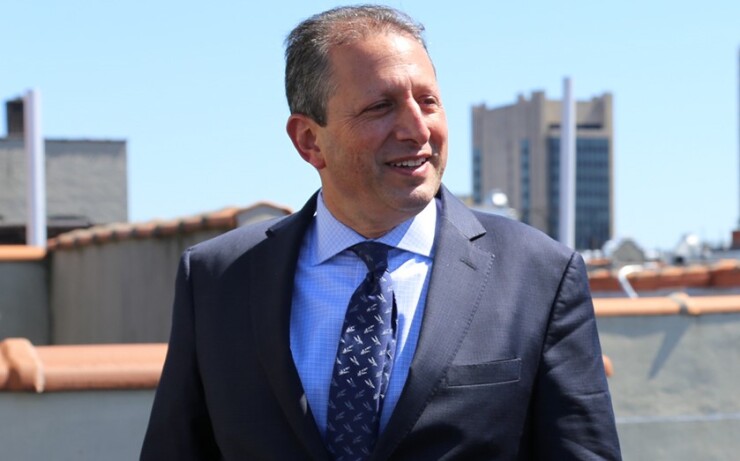New York City should deposit additional money into its Rainy Day fund to guard against having to make deep cuts during the next recession, under a proposal by Comptroller Brad Lander.
Lander recommended a new formula for annual deposits into the city’s revenue stabilization fund (RSF), providing a total of $2.5 billion in fiscal 2022, $1.8 billion over the $700 million that has been budgeted.

As the city nears the end of its fiscal year, the comptroller noted, its tax revenue has done
“Yet despite much better-than-anticipated fiscal 2022 tax collection, this year’s executive budget only adds drops to the Rainy Day Fund bucket,” Lander said in a statement. “With rising inflation, still-too-high unemployment, a declining stock market, and so much long-term uncertainty, our economy is facing headwinds. New York City will need strong reserves to weather future fiscal storms.”
State legislation in 2020 allowed the city to create the RSF, but left the details, such as the size and targets, to the discretion of the city. The state also provided no guidance on annual deposits or withdrawals.
Lander’s
“The city comptroller’s report further impresses a point fiscal monitors have been making for some time: the city has a chance to be more systematic in saving when its finances are strong so that it can be better prepared to continue to deliver necessary services when it faces unexpected challenges,” said state Comptroller Thomas DiNapoli.
A model based on Virginia’s policy, which is viewed as a best practice, would base annual deposits on excess tax revenues. Each year when the city’s non-property taxes increase more than the previous six-year average, 50% of the difference would be deposited into the Rainy Day fund.
"CBC has long championed a true Rainy Day fund,” said Andrew Rein, President of the Citizens Budget Commission. "Implementing the Rainy Day fund right — with mandatory deposits, a target size and withdrawal limits — is critical to the city’s ability to weather the next storm.”
According to the city comptroller’s office, additional deposits are feasible now, given the $3.1 billion projected surplus for fiscal 2022.
However, the mayor’s Office of Management and Budget and the city comptroller’s office are projecting lower non-property tax collections in fiscal 2023, so the city would not be required to make additional deposits into the RSF, according to the formula. If those tax collections were to grow above the previous six-year average, however, 50% of the difference would be deposited.
The proposal would also end the use of the Retiree Health Benefit Trust (RHBT) as a Rainy Day fund and return it to its original purpose of providing retiree health and welfare benefits. By placing $2.5 billion into the RSF this fiscal year, the fund’s balance would hit $3 billion.
Combined with the projected balance in the RHBT, the funds together would hit 10% of total tax revenues, which the comptroller said would be enough to weather two years of a recession without drastic cuts to city services and personnel.
Based on the proposed fiscal 2023 executive budget, the RSF and the RHBT would have a combined balance of $5.1 billion, or 7.3% of projected tax revenues, enough for less than 18 months of revenue stabilization.
Lander will detail the city’s economic and fiscal condition during his testimony on Tuesday before the city council, which is holding hearings on Mayor Eric Adam’s proposed fiscal 2023 executive budget.
Adams presented his $99.7 billion
“My office has
Lander said that instead of letting the budget reserves be dictated by politics, the city should establish and hold itself accountable to clear rules for savings in times of growth to ensure safety in times of hardship.
“The lesson of this pandemic and its economic ramifications is that we must be prepared to lessen the harm of future crises,” Lander said. “New Yorkers are resilient; our city’s reserves should be resilient as well.”
Former CBC president Carol Kellerman stressed this is good policy.
“It is critical that our elected officials refrain from spending all the revenue that is coming into the city in the short-term and set aside enough to protect against the downturn that could well be on the horizon,” Kellerman said.
New York City is one of the biggest issuers of municipal bonds in the nation. As of the first quarter of fiscal 2022, the city had about $38.13 billion of general obligation bonds outstanding.
That doesn’t include the various city agencies that issue tax-exempt and taxable bonds such as the New York City Transitional Finance Authority or the Municipal Water Finance Authority, which have $41.64 billion and $31 billion of debt outstanding, respectively.
Separately on Monday, the CBC promoted Ana Champeny to vice president for research.
“Ana is one of the foremost experts on New York City’s finances generally and has an outstandingly deep understanding of the city’s real estate markets and property taxes," Rein said. “During her CBC tenure she led our work on property tax reform, identified the COVID federal aid fiscal cliffs, developed CBC’s proposed city budget choices needed to weather the pandemic without layoffs, and was an architect of CBC’s Rainy Day fund recommendation, which was instrumental in the creation of the fund.”
Champeny said she looked forward to delving into a broader portfolio of city and state policies.
“At a time when billions of dollars are coming in from the federal government and fiscal cliffs loom around the corner, it has never been more important for independent evidence-based research to keep fiscal responsibility and efficient and effective services at the center of policy discussions,” she said.





